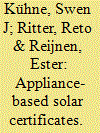|
|
|
Sort Order |
|
|
|
Items / Page
|
|
|
|
|
|
|
| Srl | Item |
| 1 |
ID:
176107


|
|
|
|
|
| Summary/Abstract |
In recent years, an increasing amount of solar energy has been produced around the globe, but too few consumers actually buy it. Three studies now show how this purchase can be promoted with an approach similar to the carbon offset program in aviation. After a fictitious purchase of differently priced appliances (e.g. electric toothbrush or TV set) in an online store, participants could buy a solar certificate for this appliance, whereby its price depended on the appliance's energy consumption as well as the selected term (e.g. 1 or 3 years) of the certificate. By purchasing such a certificate, the amount of solar energy consumed by this appliance for the selected term would be fed into the Swiss electricity grid. Study 1 showed that participants were willing to buy such a certificate, especially certificates with longer terms. That willingness, however, depended on the “solar certificate price/appliance price” ratio. While Study 2 showed that this purchase is influenced by promotions (e.g., a specific reduction in price), Study 3 showed that this purchase did not lead to a less environmentally friendly behavior afterwards. Appliance-based solar certificates easily available at the point of sale can encourage consumers to buy more solar energy.
|
|
|
|
|
|
|
|
|
|
|
|
|
|
|
|
| 2 |
ID:
147616


|
|
|
|
|
| Summary/Abstract |
This article quantifies the impact of H7N9 bird flu on chicken demand and consumer willingness to pay (WTP) in China. We measure risk perception, fear and trust against actual reduction in consumption and stated change in WTP for safe chicken between 2012 and 2013. Through a survey conducted in each year on the same Chinese urban consumers, we found that the consumption of chicken never increased after the emergence of H7N9 in 2013, and WTP for safe chicken did not necessarily increase relative to generic risks associated with consuming chicken in 2012. Factors such as the fear of H7N9's spreading, the impact of distrust (especially the distrust in government) enhanced the deviation of consumption and WTP; and the sheer mentioning of H7N9 is more important and negative than whether it was associated with a risk-perception reducing or risk-perception elevating message given to consumers.
|
|
|
|
|
|
|
|
|
|
|
|
|
|
|
|
| 3 |
ID:
132790


|
|
|
|
|
| Publication |
2014.
|
| Summary/Abstract |
This paper explores people×s preferences for a Built in Photovoltaic (BIPV) renewable energy system to be integrated into housing construction. A novel methodology was developed, to study the case of Northern Cyprus, for better understanding of possibilities that abound in BIPV integration. The methodology incorporates Building Information Modeling (BIM) as a real-time design and economic assessment tool for BIPV choices. This serves to benefit both the construction companies and potential house owners in their decision-making. In addition, it uses a Contingent Valuation (CV) method to assess the Willingness to Pay (WTP) and the Willingness to Accept (WTA) compensation. The results indicate that the capital cost of PV is not instrumental in choice, and a lower feed-in tariff could be acceptable.
|
|
|
|
|
|
|
|
|
|
|
|
|
|
|
|
| 4 |
ID:
096141


|
|
|
|
|
| Publication |
2010.
|
| Summary/Abstract |
This paper aims to determine the factors that have an impact on the consumers' willingness to pay a premium for hybrid automobiles in Turkey. A web-based random survey was conducted in different regions of Turkey. A questionnaire was administered to 1983 participants in January-March of 2009. The questionnaire was prepared by taking the issues raised in various sources into account. An ordered Probit model was used to meet the objective. Results show that variables such as income, gender, education, concerns about global warming, number of automobiles, importance of automobile performance, risk preference, attitude toward the alternative energy sources have an impact on the consumers' willingness to pay a premium for hybrids. Findings suggest that consumers who have high income, higher educational level, and concerns about the global warming are more likely to pay a premium for hybrids. This study is expected to make important contributions to the current literature related to the consumers' willingness to pay for hybrids by providing a research study from a developing country's perspective. Results of this study also make important contributions to the policy and decision makers, environmental groups and automotive industry.
|
|
|
|
|
|
|
|
|
|
|
|
|
|
|
|
| 5 |
ID:
132637


|
|
|
|
|
| Publication |
2014.
|
| Summary/Abstract |
With the increasing importance of natural gas (NG) in the energy mix, the search for a reliable liquefied NG (LNG) supply has received great attention along with energy security in Korea. However, the current level of LNG supply reliability in Korea is much lower than that in other industrialized countries. In order to improve the reliability of the LNG supply, diverse policy measures are required, which come at an additional cost paid by society. This study aims to investigate the public×s willingness to pay (WTP) for improving the reliability of the LNG supply by increasing the LNG storage rate from the current level (11%) to 20%. To this end, the contingent valuation (CV) method is applied by using national survey data of 1000 households. In particular, this study employs a one-and-one-half-bound (OOHB) dichotomous choice model, combined with a spike model, to address the responses from the CV survey with zero WTP. The annual mean WTP is estimated to be KRW 9641 (USD 8.68) per household. Expanding the value to the national population provides a value of KRW 169.43 billion (USD 152.55 million). The results indicate that people are willing to shoulder the burden of safeguarding a reliable supply of LNG.
|
|
|
|
|
|
|
|
|
|
|
|
|
|
|
|
| 6 |
ID:
133180


|
|
|
|
|
| Publication |
2014.
|
| Summary/Abstract |
In China, renewable/green electricity, which can provide significant environmental benefits in addition to meeting energy demand, has more non-use value than use-value for electricity consumers, because its users have no way to actually own this use-value. To assess the value of renewable electricity and obtain information on consumer preferences, this study estimated the willingness to pay (WTP) of Beijing residents for renewable electricity by employing the contingent valuation method (CVM) and identified the factors which affect their WTP. The survey randomly selected 700 participants, of which 571 questionnaires were valid. Half of respondents were found to have positive WTP for renewable electricity. The average WTP of Beijing residents for renewable electricity is estimated to be 2.7-3.3 US$ (18.5-22.5CNY) per month. The main factors affecting the WTP of the respondents included income, electricity consumption, bid and payment vehicle. Knowledge of and a positive attitude towards renewable energy also resulted in the relatively higher willingness of a respondent to pay for renewable electricity. The proportion of respondents replying "yes" to WTP questions using a mandatory payment vehicle was slightly higher than that for questions using a voluntary vehicle. Lastly, several policy implications of this study are presented.
|
|
|
|
|
|
|
|
|
|
|
|
|
|
|
|
|
|
|
|
|